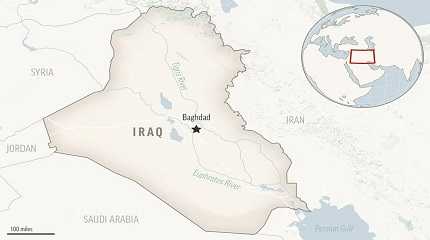
BAGHDAD (AP) — The commander of the main U.S.-backed force in Syria and Iraq’s presidency Saturday condemned what they say was a Turkish attack on an airport in northern Iraq.
Iraq’s presidency called the late Friday explosion in northern Iraq’s semi-autonomous Kurdish region a “flagrant aggression against Iraq and its sovereignty” in the area. It called on Turkey to issue a formal apology, saying it should not continue “terrorizing” Iraqis in the north.
A representative of the Turkish defense ministry said he had no information about the incident.
Turkey has spent years fighting Kurdish militants in its east and large Kurdish communities live in neighboring Iraq and Syria, where they have a degree of self-rule. Turkey considers the main Kurdish militia in northeast Syria an ally of the outlawed Kurdistan Workers’ Party, or PKK. The PKK has for decades waged an insurgency within Turkey.
On Saturday, Iraq’s National Security Adviser Qasim al-Araji, heading a high-level security delegation, arrived in Suleimanyah to discuss the issue with local officials, the state news agency reported.
The Syrian Observatory for Human Rights, a U.K.-based opposition war monitor, and some local media reported Friday that the explosion next to the Suleimaniyah International Airport was a Turkish drone attack targeting Mazloum Abdi, the leader of the Syrian Democratic Forces.
The blast came days after Turkey closed its airspace to flights to and from the airport, citing an alleged increase in Kurdish militant activity threatening flight safety. The airport’s security directorate said an explosion took place near the fence surrounding the airport causing a fire but no injuries.
Officials with the SDF and the Kurdish regional government in northeast Syria said Abdi was not in Suleimaniyah at the time and was not the target of an attack. Abdi in a tweet Saturday did not mention whether he thought he was targeted.
Rami Abdurrahman, who heads the Syrian Observatory, said Saturday that Abdi was not directly targeted but was near the airport holding a meeting with Kurdish officials when the Turkish military carried out the attack.
Retired U.S. Col. Myles B. Caggins III, a senior non-resident fellow at the U.S.-based New Lines Institute for Strategy, said the missile targeted a convoy carrying leaders of the Syrian Democratic Forces as well as U.S. advisers to the Kurdish-led force.
“Turkey sent a warning shot. A deadly and dangerous and provocative warning shot when it fired a missile at the convoy,” he said.
Caggins added that it appears Turkey was sending a warning to both the United States and Iraqi Kurds to stop supporting the SDF. He added that Turkey is likely to continue such attacks “with impunity” because it says the SDF is aligned with the PKK and “therefore Turkey feels justified in targeting” the SDF.
A statement from the Iraqi Kurdish regional government in Iraq on Friday appeared to blame local authorities in Suleimaniyah. It accused them of provoking an attack on the airport and using “government institutions” for “illegal activities.”
The regional government, with its seat in Irbil, is primarily controlled by the Kurdistan Democratic Party, while Suleimaniyah is a stronghold of the rival Patriotic Union of Kurdistan.
Qubad Talabani, deputy prime minister of the regional government and a member of the PUK, rejected the regional government statement that appeared to cast blame on his party. He said the statement “represents only one party ... and cannot speak for the entire government.”
“We strongly condemn the targeting of Suleimaniyah airport by Turkey,” Abdi tweeted Saturday, adding that the Patriotic Union of Kurdistan’s support for “their brothers in Syria is bothering Turkey.”
Abdi vowed that Syria’s Kurds “will continue with their principle relations with our brothers and allies in Suleimaniyah and we stand united against these violations.”
Caggins said he expects that the leaders of Turkey are emboldened by their ability to conduct cross-border strikes into Syria and into Iraq because the only response has been a “little bit of finger wagging and minor protest from Baghdad and Damascus and Washington.”




